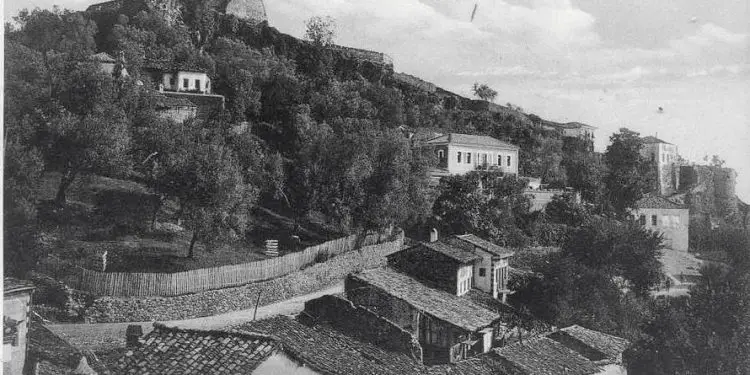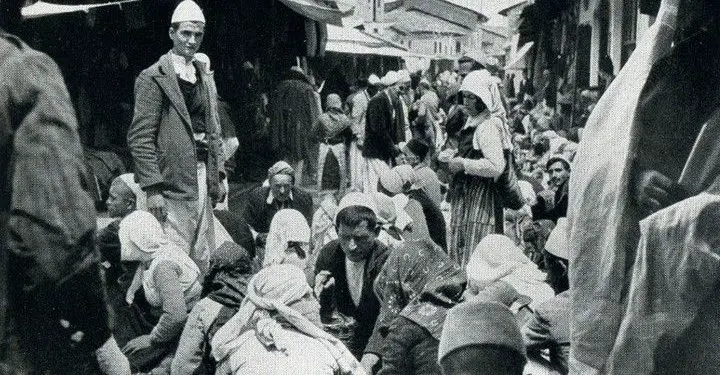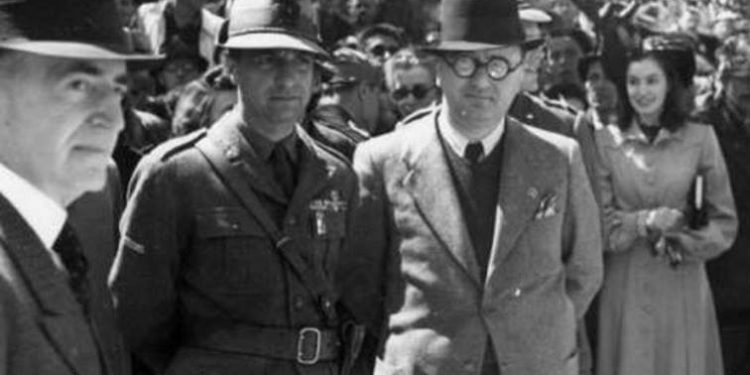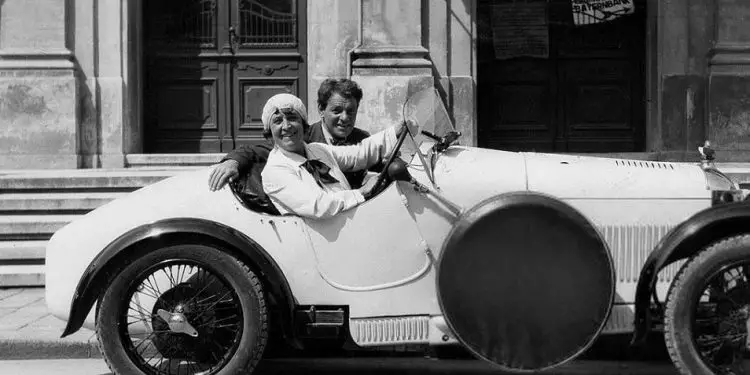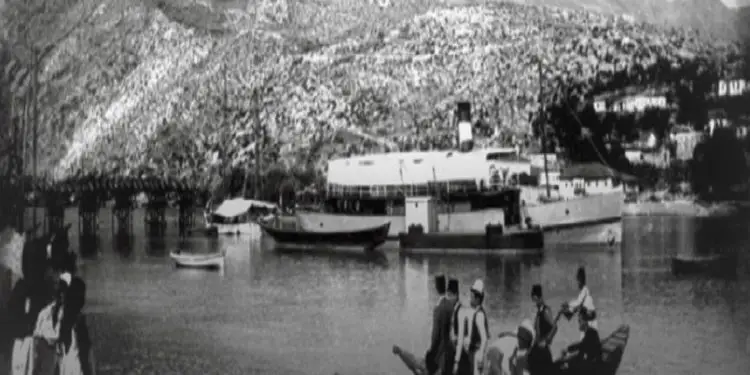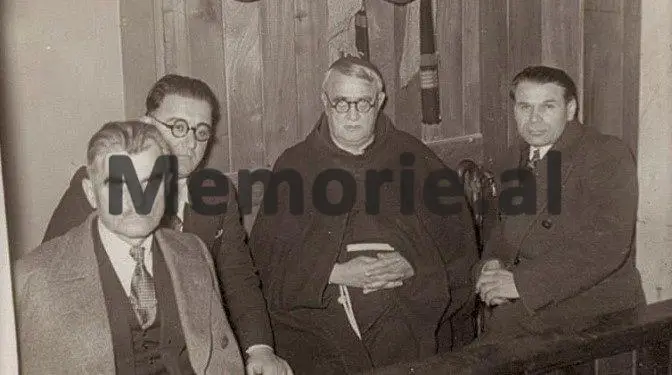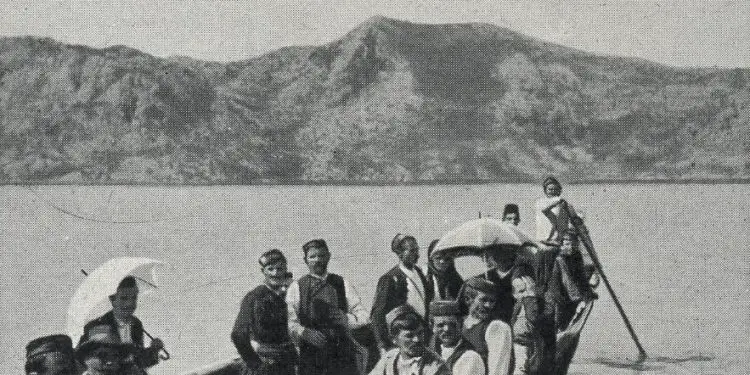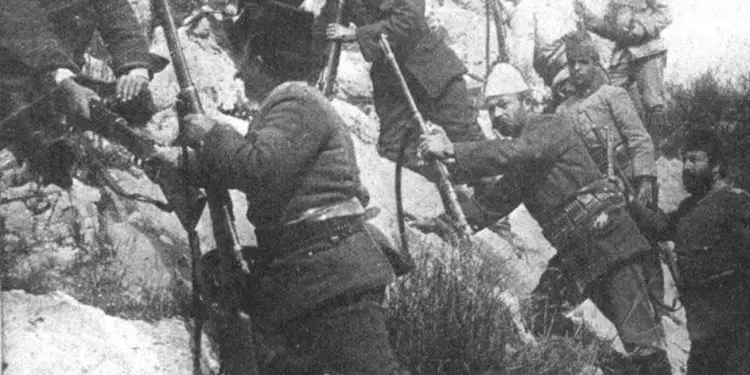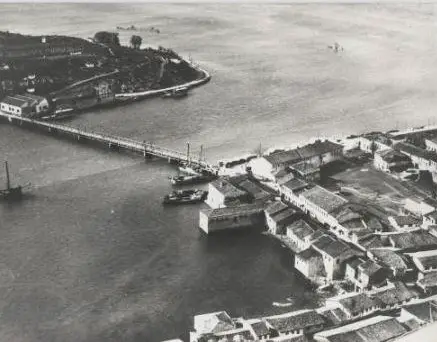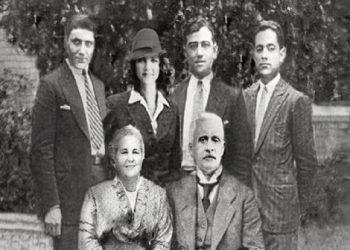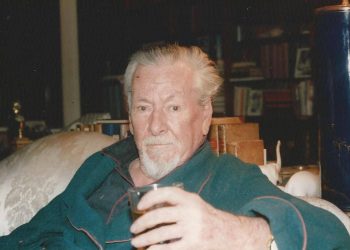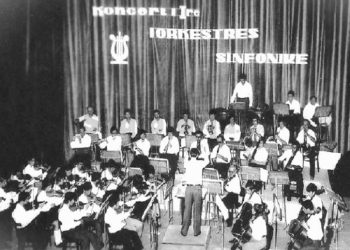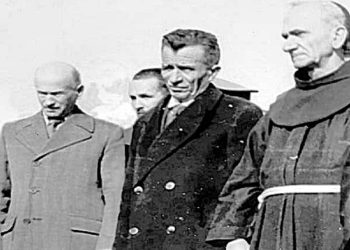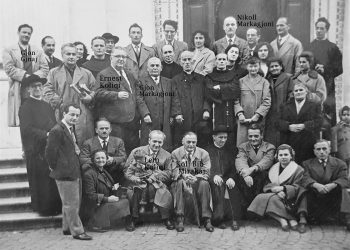By Sven Aurén
Translated by Adil N. Bicaku
Part twenty-three
ORIENTI EUROPE
Land of Albania! Let me bend my eyes
On thee, thou rugged nurse of savage men.
Lord Byron.
In the book “Orient of Europe”, the author of the work is the Swede Sven Aurén. They are impressions of traveling from Albania from the ‘30s. His direct experiences without any retouching.
In a word, the translation of the book will bring to the Albanian reader, the original value of knowing that story that we have not known and we continue to know it, and now distorted by the interests of the moment.
Now a little about what these lines address to you: My name is Adil Bicaku. I have worked and lived for over 50 years in Sweden, without detaching for a moment, the thought and feeling from our Albania.
I am now retired and living with my wife and children, here in Stockholm. Having been for a long time, from the evolution of the Albanian language, which naturally happened during these decades, I am aware of the difficulties, not small, that I will face, to give the Albanian reader, the experiences of the original.
Therefore, I would be very grateful if we could find a practical way of cooperation together, to translate this book with multifaceted values.
Morally, I would feel very relieved, paying off part of the debt that all of us Albanians owe to our Albania, especially in these times that continue to be so turbulent.
With much respect
Adil Biçaku
Continued from the previous issue
THE STRIKE SHAKES TOWARDS NORTH
And now we are sitting here in “Kursal” and drinking uzo. The immigrant, who has come home, stands in readiness to run to the counter and seeks to discover, from the appearance and appearance of the face our desires. A couple of men add to the small number of customer group: handsome, tall men with persuasive demeanor and mustaches, like branches of small hips. The rain is still dripping on the window panes. Next to me is a large crack in the glass, closed with an old bundle of gune. Water drips down to the floor of the pre-vanga planks and forms a small lake, beneath our slippery table.
Otherwise, the chatter buzzes non-stop and the atmosphere seems to be good, in this winning Albanian gold coffee. Exactly: gold digging coffee! I remember the wild movies of the West, where fierce cowboy men played poker and fired revolvers, all around unpainted wooden furniture, tiled walls, and kerosene lamps swaying. Of course it is neither played nor played here in “Kursal”, but the ambience is the same: dirty wooden furniture, dark walls with torn stickers, zinc counter with bottles and glasses, restaurant owner, who says “All right, sir”, in the broader jenkee dialect.
He is a lucky man, the owner of the most frequented restaurant in Kruja. To my question, if it had been better in America, where about 50,000 Albanian immigrants, work, live and heartily informed the evil Fan Noli, on the mistakes and failures of King Zog and he answers, ‘no’, without hesitation. Maybe he was lucky, better economically in the US, but still, and is it not worth the privilege to make some sacrifices, to trespass on the land of your homeland? In addition, it is much better in Albania, now at this time. “King Zog, is our Skanderbeg back”! He says with a clear allusion to the great memories of Kruja.
That little school teacher, who was given to us by the prefect as a guide and who sits and warms his hands over the steam of the cup of coffee, seems very proud of the apt response of the immigrant. This is a nice gentleman and quite good at language, with an impressive thirst for knowledge. He has Albanian history as his love hobby.
-Do you not feel a great responsibility to live like this, under the shadow of Skanderbeg? I ask.
-Of course it is mandatory, he says. But we are not the only ones here in Kruja who feel this way. Our whole nation has very clear obligations of great memories.
-But it is half a millennium, between Skanderbeg and King Zog. Is it not strange enough that your King is the only Albanian from the days of Skanderbeg, whose name is remembered all over the world? I’ll give it back.
Pang!
The school teacher reacts quickly and the cup of coffee remains halfway to the mouth. The restaurant owner is left speechless by the startling shock. Excellent farmers are silent about talking. They do not understand what is being said, but they see the physiognomy of the face that something serious is happening. As the icy silence spreads like a thunderbolt over tables, chairs, and people, I slowly begin to realize the terrible blunder of my folly. I am guilty of an insult, which in ordinary cases, requires blood. But this is no ordinary case. This is a stupid and uneducated outsider, who no longer understands.
Teacher, break the silence. His mouth turns to a smile, but he could not beat more than a chuckle. The hand, which has grasped the ear of the cup, is white above the knuckles.
-I have… I have probably misunderstood your question, with a voice, which tries to make it up. But if you really think that between Skanderbeg and our current King, there were no Albanians who had no voice in the world, and then I hope you allow me to refute this statement. There is no need to believe that I am lying or exaggerating. It is very easy to verify my data.
The silence in “Kursal” falls again. The teacher thinks about how to start and his speech is anxiously awaited on all sides.
He says:
Do you really believe that during those four hundred years that we were tortured under Turkish rule, we failed to protect our nation and race in a dignified manner? Who were the most famous men in Turkey? Albanians. Twenty-five great viziers, the Sultan has taken from our mountains, twenty-five men, whom the superpowers both feared and admired.
Who is the master of the world-famous mosques of Turkey, for the wonderful work in Adrianople and Constantinople? The Albanian Sinan, the great, incomparable Sinan, about whom researchers in later times have written, stacks with thick dissertations. Albanians were the most famous generals and governors of the Turkish state. Albanians constituted the backbone of the Turkish administration.
It probably seems to you that this has happened a long time ago and I need to drop fresh examples. By the way, which nation do you think has left Romania its famous tribe? Albania. The Gjika family is of Albanian origin and comes from Përmet. But I will bring out our closest time in life. The president of the Greek state, Konduroti, was Albanian. Remember Mehmet Ali, the first kediv of Egypt, the man who founded the kedid dynasty?
He was Albanian, born in Voskopoja near Korça. Fuad, the current King of Egypt, is therefore of Albanian blood. Or think of Francesco Crispi, the famous Italian statesman and prime minister who led Italian politics for the first time when he clashed with the Abyssinians. He came from Sicily, that’s true. But he came from the large colony of Albanian emigrants in Ribera and was of pure Albanian descent.
The teacher paused. The atmosphere eased. I read triumph in his appearance and in the attitude of the immigrant, who is amazed and impressed. The emigrant stands there with his chest forward and his head up, as if it were Skanderbeg himself, who witnessed the defeat of the Turks. He is right. The school teacher is right. “Kursal” and Kruja, have won an excellent triumph.
-This is true, adds the teacher with a noshalant tone, which dealt with a small thing, but therefore, exactly does so much effect. It’s true; I forgot a few other examples. You certainly know the famous railway, Semering in Austria? It was built by Karl von Gega, who is also from an Albanian family. Gega, comes simply from gegs. This example probably did not matter so much. But what do you say about Alexander Moses, that great artist, who died a year ago?
Moisiu’s father was Albanian and shortly before his death, Aleksandër Moisiu, planned a trip home. To the “mountains of the parents”, as it is known to have been expressed. In addition, I have a little private speculation as to the name Moses. One of the most famous and mentioned generals of Skanderbeg, was called Moisi Golemi. What a perspective for a tribal explorer!
***
When we go out on the road slabs, shining from the rain and hear the slamming door of the “Kursal” crashing behind us, the storm has calmed down. Threatening dark clouds ride like spears over our heads, they are so close that it seems to me that I can catch them, but the rain no longer whistles in your face. The air of the high mountains is as clean as ever. From the valley below the city, comes a pleasant aroma of flowers and trees.
It is a small garden outside the café, with some chairs and tables. From the west the garden is open and when I approach the barrier of the fragile wall and find that this café is in the full dignity of Kruja. Like a magnificent nest of a bird of prey, hangs the city of Skanderbeg, under the steep peaks of a high mountain. “Kursal”, which is exactly a small part of this nest, has chosen a bold position, in its extreme canteen.
This is a dizzying height. Far down, at the bottom of the valley, the frequent olive groves give it a dark green color. Intense white spot among the greenery is one of the many tombs of Bektashi dervishes. I am informed that she is one of the richest in Albania and the father of the tekke is a wise man with great influence.
So I see the valley quite well, from the excellent viewpoints I am in. But I see nothing but the valley. The high, steep mountains, which make up the farthest wall, disappear from the clouds. The massif of the distant Alps is with the fog, which hangs. But I know, if the day was clear and the sky cloudless, then I would have a completely different picture before my eyes. I would have seen the mountain ranges of the Alps, shining with their snowy peaks. Yes, the view would be really good, so I would have seen the Adriatic, sparkling like a sapphire in a pan, far and wide.
Of secondment
When the tale of the Turkish superpower was coming to an end and the sultans found it increasingly difficult to keep the great empire united, the whole Balkans rejoiced. Of those who showed the most excitement was King Nikolla of Montenegro. Finally, the Montenegrin national dream could be realized: Montenegro would take over Shkodra, the Albanian city, there on the other side of the White Mountain slopes and together with the northern part of Albania, a Great Montenegro, with the famous Shkodra as a worthy capital! This dream had a very old date, but never before, had the predictions been so brilliant, to be realized. Now the case had come. Now it will happen.
King Nicholas, immediately began very careful preparations. He proclaimed the order for general mobilization and made an excellent army. He tasked a credible writer with taking care of the editorial board of Montenegro’s only newspaper, while the editor-in-chief, the King himself, set out for battle. He ordered a Palace official to administer the Montenegrin stamps, which he usually sold to his own subjects, who wrote letters. And together with the Serbs, it is not good to be alone; he marched from the end of October 1912, on the high mountains and attacked Shkodra.
Shkodra presented Nikolla with greater difficulties than he had expected. After five months of bloody fighting, he still had not managed to enter the city limits, but no less he lost 10,000 soldiers, or a third of his army. He decides that all military forces would be engaged in a decisive attack on March 13. Esad Pasha, who had regained the defense of the city after the Turkish governor, defied this world-famous attack in a brilliant way and was called the “Hero of Shkodra” by the world press.
It seemed as if Nikolla would be forced to return home to Cetinje, again without doing any work, when Esad Pasha, suddenly and incomprehensibly, surrendered the city, and Nikita, was able to make an impressive march inside. The dream was realized. Greater Montenegro had been born.
Are you telling me that joy, if it was permanent? The history of the Albanian principality lasted five months. Greater Montenegro did not become older than 15 days. On April 22, 1913, Nikolla marched to that city, which cost so many lives of Montenegrins; on May 7 he was forced, due to the threats of Austria, to leave Shkodra from the superpowers. Greater Montenegro, again, was reduced to a dream, a dream that would never come true. A year later World War I broke out. Montenegro, fought on the side of the Allies and after the end of the war, is rewarded to become a Yugoslav province.
Then, when Nikolla proudly and cheerfully rode inside the defeated Shkodra, there was a young man named Koliqi in the crowd of spectators. The same Koliq, who today is my guide. Early this morning, I really said goodbye to the romantic medieval of Kruja and in the afternoon, I entered the most pronounced atmosphere of Shkodra.
Koliqi deals mainly with literary activity. He writes novels and short stories, in a sentimental genre, as I understand it and he has a name in literary Albania. This is a very educated gentleman, who speaks perfect French and has the history of Shkodra, in five fingers. With a lot of fire he describes the opposition of the brave inhabitants of Shkodra, to the attacks of the Montenegrins and with a lot of humor; he facilitates the story with anecdotes about Nikolla.
The Nikite anecdote is known to abound. There would hardly have been a crowned head all over the world, which has given rise, for the origin of the varied bloom, to anecdotes like the original King of the Montenegrins. But since this is a book about Albania and not about Montenegro, so I just want to tell, one of the hundreds of stories by Koliqi. Maybe this has its place, because it partly resembles Shkodra.
It was during the 15 days of life of the great Montenegro. An American, who was in Shkodra and had performed a service to Nikolla, would be rewarded with a decoration. He took it personally from the King’s hand, thanked him and left.
Nikolla’s pride had, as is well known, a magnificent rise. When the decorated American returned to his country and began to inspect his beautiful decoration a little more closely, he was thus forced to conclude that it was made of very worthless parts. Those beautiful precious stones were imitation, gold not gold, serm not serm. As a rich man, he decided to produce a new but real decoration with Nikita decoration as a model.
Several years passed and one day it happened that the American had his way through Cetinje, where he decided to go to the King for an audience. He therefore put on his tailcoat, hung the decoration which he had made, and presented himself at the meeting, to His Majesty. Nikolla received him very kindly and they had a pleasant intense conversation, but when his eyes went to the decoration, the sparkle stopped in the middle of the sentence.
-When did you get it? He asked.
-This Your Majesty gave it to me, to me in Shkodra in 1913, the American answers.
-It belongs to a very low class. You will get another one!
Therefore, His Majesty, who had a special keen eye for precious metals and precious stones, dismantled the expensive decoration for the American and disappeared into a room, climbed up and after a while, returned with another decoration,. From the upper class, but from the same quality as the one he received in Shkodra.
This anecdote tracker, Koliqi, is an excellent guide, who understands to direct my steps, in a fair way, here according to the number of population, second but in area and view the largest city in Albania.
Shkodra has a wonderful position over 48 km. along the length of Lake Shkodra, on its surface, are reflected the sharp dignified silhouettes of the Alps. Just a few kilometers further on, the Yugoslav border begins, almost exactly the same route that the Montenegrin border line had before the Allies decided to form Yugoslavia. It is only a few hours by car, from here to the old capital of Nikolla that the tourists of the Yugoslav Ragusa, enthusiastic sun worshipers, travel on those crooked roads, to pass the great joy of summer.
Nikolla’s old palace and government building have their charms. But longer than up to Cetinje, the tourists of Ragusa do not dare to extend their trip. That short road to Shkodra, in the country of Albania, does not seem to attract them, although Shkodra is one of the most beautiful, most interesting and most mentioned cities in the Balkans. You can look for the cause in the economic situation of Albania. Albania is a poor country, which does not have the same opportunities for an effective propaganda for tourism, as the strong neighboring country.
The inhabitants of Shkodra do not even bother to go to Cetinje and Yugoslavia, although it may be thought, although the abundant connection with steamers from Ragusa should have had a practical significance for them. If the resident of Shkodra, will leave for a trip, or travels by land, to Durres, or even by river boat to that city. Shkodra actually has two rivers nearby, the Drini and the Buna and the latter, flows from Lake Shkodra to the Adriatic Sea and is navigable, by sailing boat.
Buna plays a major role, as a link and has transformed Shkodra, into an extremely highly protected coastal city. With a Yugoslav steamer, you can also do a lap, from Lake Shkodra, on the Albanian side to the Yugoslav side. Memorie.al




